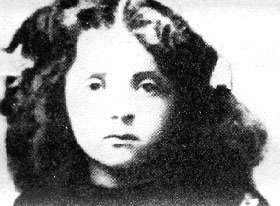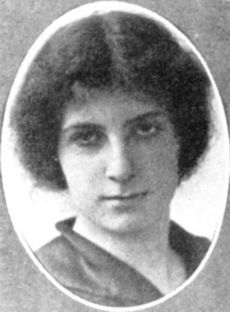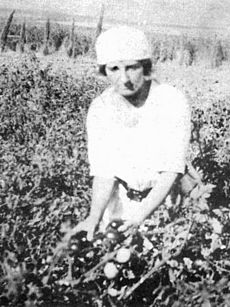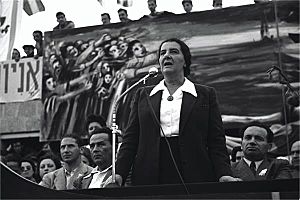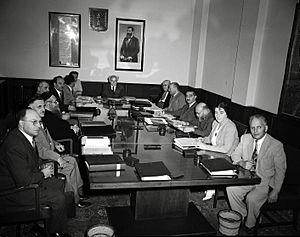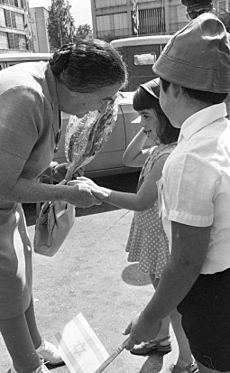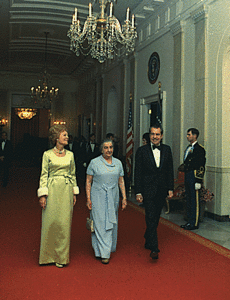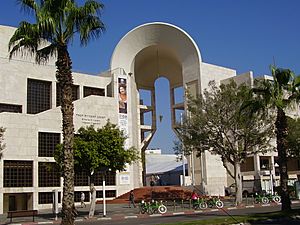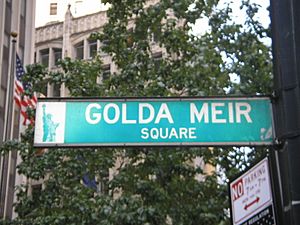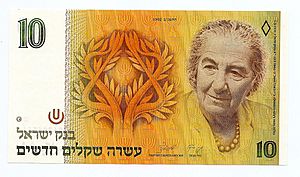Golda Meir facts for kids
Quick facts for kids
Golda Meir
|
|
|---|---|
| גולדה מאיר | |
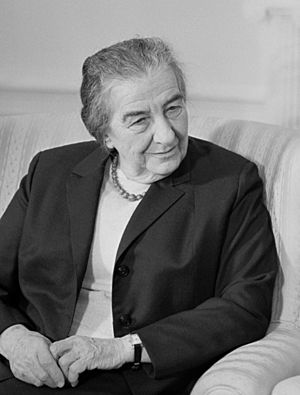
Meir in March 1973
|
|
| 4th Prime Minister of Israel | |
| In office 17 March 1969 – 3 June 1974 |
|
| President | Zalman Shazar Ephraim Katzir |
| Preceded by | Yigal Allon (Acting) |
| Succeeded by | Yitzhak Rabin |
| Minister of Internal Affairs | |
| In office 16 July 1970 – 1 September 1970 |
|
| Prime Minister | Herself |
| Preceded by | Haim-Moshe Shapira |
| Succeeded by | Yosef Burg |
| Minister of Foreign Affairs | |
| In office 18 June 1956 – 12 January 1966 |
|
| Prime Minister | David Ben-Gurion Levi Eshkol |
| Preceded by | Moshe Sharett |
| Succeeded by | Abba Eban |
| Minister of Labour | |
| In office 10 March 1949 – 19 June 1956 |
|
| Prime Minister | David Ben-Gurion |
| Preceded by | Mordechai Bentov (Acting) |
| Succeeded by | Mordechai Namir |
| Ambassador to the Soviet Union | |
| In office 1948 – 10 March 1949 |
|
| Prime Minister | David Ben-Gurion |
| Personal details | |
| Born |
Golda Mabovitch
3 May 1898 Kyiv, Kiev Governorate, Russian Empire (now Kyiv, Ukraine) |
| Died | 8 December 1978 (aged 80) Jerusalem, Israel |
| Political party | Mapai (before 1968) Labor Party (1968–1978) |
| Other political affiliations |
Alignment (1969–1978) |
| Spouse |
Morris Meyerson
(m. 1917; died 1951) |
| Children | 2 |
| Alma mater | University of Wisconsin-Milwaukee |
| Signature |  |
Golda Meir (born Golda Mabovitch; May 3, 1898 – December 8, 1978) was an important Israeli leader. She was a politician, a teacher, and a kibbutznikit (someone who lived and worked on a kibbutz, which is a special community farm in Israel). Golda Meir served as the fourth Prime Minister of Israel. She held this top leadership role from 1969 to 1974.
She was the first and only female head of government in Israel. She was also the first female head of government in the Middle East. People sometimes called her the "Iron Lady" of Israeli politics. This nickname meant she was strong and determined. She was known for being practical and a very good speaker. Her ability to speak well, especially in English, helped her raise a lot of money for Israel when the country was new.
Golda Meir was born in Kyiv, which was then part of the Russian Empire. When she was a child, her family moved to Wisconsin, United States, in 1906. She became a teacher there. Later, after she got married, she and her husband moved to Mandatory Palestine in 1921. They settled on a kibbutz.
During her time as prime minister, Israel faced a big challenge called the Yom Kippur War in 1973. Israel was surprised by the attack and faced difficulties at first. But they fought back and won against the invading armies. Golda Meir resigned the next year because of public feelings about the war. She passed away in 1978 from a type of cancer.
Contents
- Early Life and Moving to America
- Returning to Milwaukee and Activism
- Moving to Mandatory Palestine
- Early Political Work
- Role in Israel's Founding
- Government Roles Before Becoming Prime Minister
- Becoming Prime Minister (1969–1974)
- Later Life and Passing (1974–1978)
- Personal Life
- Awards and Recognition
- Legacy and Portrayals
- Published Works
- See also
Early Life and Moving to America
Golda Mabovitch was born into a Jewish family in Kyiv, which is now in Ukraine. Her birthday was May 3, 1898. Her father, Moshe, was a carpenter. Golda wrote in her book that she remembered her father boarding up their door. This was because of rumors about attacks on Jewish communities called pogroms. She had two sisters, Sheyna and Tzipke. Five other brothers and sisters died when they were very young.
In 1903, Golda's father, Moshe, went to New York City to find work. While he was away, the family moved to Pinsk (now in Belarus). In 1905, Moshe moved to Milwaukee, Wisconsin, for better work. He found a job at the local railroad yard. The next year, he saved enough money to bring his family to the United States. Golda, her mother, and sisters traveled to Milwaukee by train.
Golda's mother ran a small grocery store. By age eight, Golda often had to watch the store. She went to Fourth Street Grade School from 1906 to 1912. Golda was a leader even then. In 1908, she and a friend started the American Young Sisters Society. This group raised money to buy textbooks for their classmates. She even rented a hall for a public meeting. Even though she was often late because of working in the store, she was the best student in her class when she graduated.
In 1912, she started North Division High School. She also worked part-time. Her mother wanted her to leave school and get married, but Golda refused.
In 1913, Golda moved to Denver, Colorado, to live with her married sister, Sheyna. There, Golda went to North High School. Her sister's home was a place for many interesting discussions. Golda heard debates about Zionism (the idea of a Jewish homeland), literature, women's suffrage (women's right to vote), and workers' rights. She later said these talks helped shape her beliefs.
Around 1913, she started dating Morris Meyerson, who would become her husband. He was a sign painter and believed in socialism.
Returning to Milwaukee and Activism
In 1914, Golda had some disagreements with her sister. She left her sister's home and found a job. After making up with her parents, she went back to Milwaukee. She finished high school at North Division High in 1915. While there, she became very active in a youth movement called Young Poale Zion. This group supported the idea of a Jewish homeland based on socialist ideas. She gave speeches at public meetings and became a strong supporter of this movement.
She went to a teachers college in Milwaukee in 1916. In 1917, she started teaching at a Yiddish-speaking school in Milwaukee. There, she became even more dedicated to the idea of a Jewish homeland.
On July 9, 1917, Golda became a citizen of the United States. This happened because her father had become a citizen, and at that time, children under 21 also became citizens.
On December 24, 1917, Golda married Morris Meyerson. Golda had one condition for marriage: they had to move to Palestine. She wanted to move right away, but World War I stopped all travel across the ocean. So, she put all her energy into her activism. Soon after their wedding, she traveled across the United States to raise money for her movement.
Moving to Mandatory Palestine
In 1921, after the war ended, Golda and Morris moved to Palestine. At that time, Palestine was under British control, known as the British Mandate. Golda's sister Sheyna, her daughter, and Golda's childhood friend also came with them. They traveled by ship from New York to Naples, then by train to Tel Aviv. Golda's parents later moved to Palestine in 1926.
After being turned down at first, they were finally accepted into a kibbutz called Merhavia. This kibbutz was in the Jezreel Valley. Golda's jobs included picking almonds, planting trees, working with chickens, and running the kitchen. The kibbutz leaders saw her strong leadership skills. They chose her to represent them in the Histadrut, which was a big organization for workers.
In 1924, Golda and Morris left the kibbutz. They lived in Tel Aviv for a short time. Then they settled in Jerusalem. They had two children there: a son named Menachem in 1924 and a daughter named Sarah in 1926. Golda went back to Merhavia for a short period in 1925.
Early Political Work
In 1928, Golda Meir was chosen as the secretary of the Working Women's Council. She spent two years (1932–1934) in the United States. She was there to represent the organization and to get special medical care for her daughter's kidney illness.
When Golda returned from the United States in 1934, she joined the main committee of the Histadrut. She quickly moved up and became the head of its Political Department. This job was very important training for her future leadership roles in Israel.
In July 1938, Golda Meir was the Jewish observer from Palestine at the Évian Conference. This meeting was called by U.S. President Franklin D. Roosevelt. Its purpose was to discuss what to do about Jewish refugees escaping Nazi persecution. Representatives from 32 countries said they felt sorry for the Jewish people. However, most refused to let the refugees into their countries. Only the Dominican Republic offered to take a large number of refugees. Golda was very disappointed. She told the news, "There is only one thing I hope to see before I die and that is that my people should not need expressions of sympathy anymore."
During World War II, Golda Meir held several important positions in the Jewish Agency. This organization acted like the government for the Jewish community in British Palestine.
In June 1946, Golda became the acting head of the Jewish Agency's Political Department. This happened after the British arrested other leaders. This was a very important time for her career. She became the main person talking between the Jewish community in Palestine and the British rulers.
In 1947, she visited Cyprus. She met Jewish people who were held in camps there. The British had stopped them from entering Palestine illegally. Golda tried to convince them to let families with children go to Palestine first, as there was a small limit on who could enter. She was mostly successful.
Role in Israel's Founding
Preparing for a New Nation
Before the 1947-1949 Palestine War began, Golda Meir met with King Abdullah I of Jordan in secret. King Abdullah was seen as the only Arab leader who might work with a future Israeli state. The meeting went well. It seemed Abdullah was not interested in invading and was willing to cooperate.
Golda felt her role in the war was small at first. But she played a very important part in raising money. In January 1948, the Jewish Agency needed funds for the war and for the new country of Israel. They thought they could only raise about $7 to $8 million from American Jews. Golda Meir, however, raised over $30 million. Her success came from an emotional speech she gave in Chicago on January 22. She traveled to many cities in the United States. She returned to Israel on March 18.
The money she raised was vital for winning the war and creating Israel. Compared to the Arab side's budget, her fundraising was huge. David Ben-Gurion, Israel's first Prime Minister, said Golda's role as the "Jewish woman who got the money which made the state possible" would be remembered forever.
However, when she came back, she faced a political challenge. She was not included in the small, important cabinet of the new government. She was only in the larger People's Council. Ben-Gurion argued that a woman should be in the cabinet. He even thought about giving up his own spot for her.
On May 10, Golda had a second secret meeting with King Abdullah I. She traveled to Amman disguised as an Arab woman. He suggested that Palestine become part of Jordan, with some self-rule for Jewish areas. Golda said no to this idea. After this, it seemed likely that Abdullah I would invade.
Signing the Declaration of Independence
On May 14, 1948, Golda Meir was one of 24 people who signed the Israeli Declaration of Independence. She later remembered, "After I signed, I cried." She said she felt like she was part of a huge historical moment, just like those who signed the U.S. Declaration of Independence.
The day after Israel declared independence, the war continued. Golda also lost her job because her department became the new Ministry of Foreign Affairs.
On May 18, she went on another fundraising trip. This time, she raised about $50 million. In total, her efforts brought in around $90 million. This was about one-third of the total cost of the war. During this trip, she received the first Israeli passport. While she was away for ten weeks, Israel was heavily affected by the war.
On June 25, while still in the United States, Golda Meir was appointed as the special representative to the Soviet Union. The Soviet Union had recently recognized Israel as a country.
Golda was not happy about this new job. She did not speak Russian and worried about being lonely in Moscow. She said, "At last we have a state. I want to be there. I don't want to go thousands of miles away. Why do I always have to go away?"
Her return to Israel was delayed because of a car accident. Soviet officials wanted an Israeli representative quickly. So, she went back to Israel on July 29, even though her doctor told her to rest. Her leg often hurt her in later years.
Government Roles Before Becoming Prime Minister
Ambassador to the Soviet Union (1948–1949)
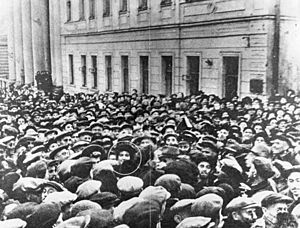
Golda Meir served as Israel's special representative to the Soviet Union from September 2, 1948, to March 10, 1949.
She was known for not liking formal diplomatic rules or using interpreters. She did not drink or dance and was not interested in gossip or fashion. This was a difficult but important job. Good relations with the Soviet Union helped Israel get weapons from Eastern European countries.
However, relations were complicated. The Soviet Union had policies against religious groups and nationalist movements. They closed Jewish religious places and banned the study of Hebrew. They also stopped people from moving to Israel.
Soon after she started her job, there were anti-Jewish actions in the Soviet Union. Golda and other Israeli representatives visited Russian Jewish businesses, synagogues, and performances to show support.
On October 3, during Rosh Hashanah (a Jewish holiday) celebrations, thousands of Russian Jews gathered around her at the Moscow Choral Synagogue. They chanted in Yiddish, "Nasha Golda," meaning "Our Golda." She said she felt "caught up in a torrent of love." This event was so important that it was shown on an Israeli banknote years later.
Golda told her friends that she felt isolated in Moscow. She felt she had not achieved much for Russian Jews. She felt guilty for not doing more, thinking she could have been in their situation if her father had not moved to the United States.
She decided to run in the first Knesset (Israeli parliament) elections in January 1949. She returned to Israel and campaigned for her party, Mapai. Mapai won the most votes, and Ben-Gurion invited her to join the government. She became a member of the Knesset on March 8 and stayed there until 1974.
Labor Minister (1949–1956)
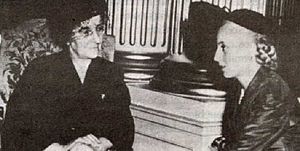
Ben-Gurion first offered Golda the job of "deputy prime minister," but she turned it down. She found the title unclear and did not like the idea of working with so many different government departments.
Instead, she became the Labor Minister. She held this job from March 10, 1949, to June 19, 1956. Golda enjoyed this role much more, calling them her "seven beautiful years." She liked being able to act quickly. She was also one of the most powerful Israeli politicians at the time.
Her main challenge was getting enough money, especially to help the millions of immigrants arriving in the new country. In October 1950, Golda announced a three-year plan for Israel's growth. She said it would cost $15 billion over 15 years. The Israeli government got a loan from the United States government and American Jews. This covered 40% of the budget.
Golda helped build over a hundred temporary camps called ma'abarot for immigrants. These camps had simple huts and tents. She received some criticism for this. But she explained that her budget was limited, and it took time to build proper homes. By 1956, most of these camps were gone. 120,000 families moved into permanent housing.
Golda felt she was very productive during this time. She created welfare policies and helped immigrants find jobs. She also started major projects to build homes and roads. From 1949 to 1956, many new apartments and houses were built. New hospitals, schools, and roads were also constructed. Despite concerns from others, Golda worked to establish social security, maternity benefits, and insurance for work accidents.
In 1955, Golda reluctantly ran for mayor of Tel Aviv. At that time, mayors were chosen by the city council. She lost by two votes because religious groups did not support her, saying she was a woman. She was angry about the sexism but happy to stay in the government.
Foreign Minister (1956–1966)
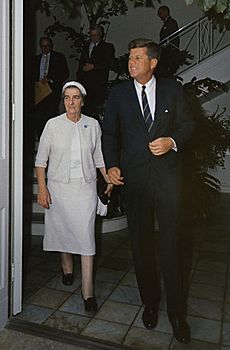
In October 1955, Ben-Gurion made Golda Meir the foreign minister. She replaced Moshe Sharett. Ben-Gurion and Sharett had disagreements. Golda, however, had a loyal and friendly relationship with Ben-Gurion. While she eventually liked her new job, she did not like the people in her department who still supported Sharett.
Golda served as foreign minister from June 18, 1956, to January 12, 1966. Her first months as Foreign Minister happened during the 1956 Suez Crisis. In this event, Israel, Britain, and France invaded Egypt. They wanted to regain control of the Suez Canal and ensure Israel could use the Straits of Tiran. Golda planned and worked with the French government before the invasion. During United Nations discussions about the crisis, Golda led the Israeli group. After the fighting, the United States, the Soviet Union, and the United Nations made the three countries withdraw.
As foreign minister, Golda Meir worked to build connections with new countries in Africa. She wanted to gain allies for Israel around the world. She also believed Israel had experience in building a new nation that could help African countries. She also worked hard to convince the United States to sell weapons to Israel. In 1962, the U.S. agreed to sell Hawk missiles to Israel. Israel's relationship with the Soviet Union remained difficult during her time.
In October 1957, Golda's foot was slightly hurt when a small bomb was thrown into the Knesset (parliament) meeting room.
In 1958, Golda praised Pope Pius XII for helping Jewish people.
In late 1965, Golda, then 67, was diagnosed with a type of cancer. In January 1966, she retired from her role as Foreign Minister. She said she was tired and not well. However, she continued to serve in the Knesset and as a leader of her party.
Becoming Prime Minister (1969–1974)
Prime Minister Levi Eshkol suddenly passed away on February 26, 1969. This led to a new election to choose a leader. Most people thought Golda Meir would be chosen. Golda, at 71, had mixed feelings because of her health. On March 7, 1969, her party chose her as the new leader. She agreed, saying she would honor her party's decision.
Golda Meir served as prime minister from March 17, 1969, to June 3, 1974. She kept the national unity government that was formed after the Six-Day War in 1967. In this government, her party joined with two others to form the Israeli Labor Party.
Six months after becoming prime minister, Golda led her party in the 1969 general election. Her party won 56 seats, which is still the best result for a single party in Israel's history. The national unity government continued.
In 1969 and the early 1970s, Golda Meir met with many world leaders. She wanted to promote her ideas for peace in the Middle East. She met with Richard Nixon (U.S. President) in 1969, Nicolae Ceaușescu (Romanian leader) in 1972, and Pope Paul VI in 1973. In 1973, she hosted the leader of West Germany, Willy Brandt, in Israel.
In August 1970, Golda accepted a U.S. peace plan. This plan called for an end to the War of Attrition and for Israel to agree to withdraw to "secure and recognized boundaries" for peace.
On February 28, 1973, during a visit to Washington, D.C., Golda Meir agreed with Henry Kissinger's peace idea. This idea was about "security versus sovereignty." Israel would accept Egyptian control over all of Sinai. In return, Egypt would accept Israel having a presence in some important places in Sinai.
Munich Olympics (1972)
After the terrible attack at the 1972 Summer Olympics in Munich, Golda Meir asked the world to "save our citizens and condemn the unspeakable criminal acts." She was very angry that there seemed to be little action from other countries. She then ordered Israel's spy agency, the Mossad, to find and punish those responsible for the attack.
Dispute with Austria (1973)
In the 1970s, about 200,000 Jewish people from the Soviet Union were allowed to leave for Israel through Austria. In September 1973, seven of these people were taken hostage by Palestinian militants at the Austria–Czechoslovakia border. The leader of Austria, Bruno Kreisky, then closed the Jewish Agency's transit center in Schönau, Austria. A few days later, Golda Meir tried to convince Kreisky to reopen the center. She reminded him of his own Jewish background. But Kreisky did not change his mind. Golda returned to Israel, very upset. A few months later, Austria opened a new transit camp.
Yom Kippur War (1973)
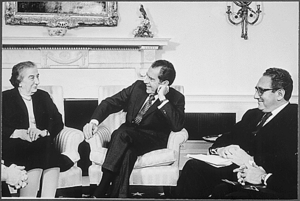
As Israel's leader during this short war, Golda's main goal was to decide when to start operations. She also wanted to give the Israeli army enough time and supplies to win. In the days before the Yom Kippur War, Israeli intelligence was not sure an attack was coming. However, on October 5, 1973, Golda Meir learned that Syrian forces were gathering on the Golan Heights. She was worried. She thought it was similar to what happened before the Six-Day War. But her advisers told her not to worry. They said Israel would have enough warning before a war. Most Israelis thought it was unlikely that Arab countries would attack after the Six-Day War. So, Golda did not call up Israel's forces early.
Soon, though, the threat of war became very clear. Six hours before the fighting began, Golda met with her defense minister and a general. The general wanted to call up the entire army and launch a surprise attack on Syrian forces.
On October 6, Golda approved calling up all forces. But she said no to a surprise attack. She was worried that Israel would be seen as starting the war. This would hurt Israel's chances of getting important help and military support, especially from the United States. She made sure to tell Washington about her decision. U.S. Secretary of State Henry Kissinger later said that if Israel had attacked first, they would not have received "so much as a nail" in aid.
Resignation (1974)
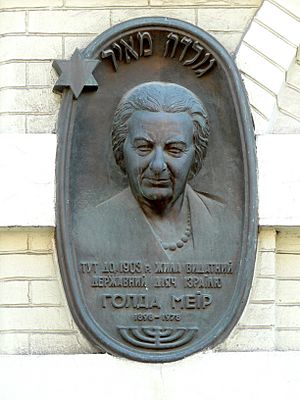
After the Yom Kippur War, Golda Meir's government faced many arguments. People questioned why Israel was not better prepared for the war. A special committee investigated the war. It said Golda was not "directly responsible" for the lack of preparation.
Her party won the elections in December 1973. However, her group lost seats and could not form a majority government easily. Golda Meir announced she was resigning as Prime Minister on April 11, 1974. She left the Knesset (parliament) on June 7, 1974. She never held office again. She felt it was the "will of the people" and that she had served long enough. She said, "Five years are sufficient... It is beyond my strength to continue carrying this burden." Yitzhak Rabin took over as Prime Minister on June 3, 1974.
Later Life and Passing (1974–1978)
In 1975, Golda Meir published her autobiography, My Life. It became a very popular book.
On November 21, 1977, Golda Meir spoke at the Knesset. She spoke to Egyptian President Anwar Sadat during his historic visit to Israel. He was the first Arab leader to visit. She said his visit was important so that future generations would not have to fight wars. She praised Sadat for his courage and vision. She hoped that even with many differences, peace could be achieved with understanding.
On December 8, 1978, Golda Meir passed away from cancer in Jerusalem. She was 80 years old. She was buried on Mount Herzl in Jerusalem.
Personal Life
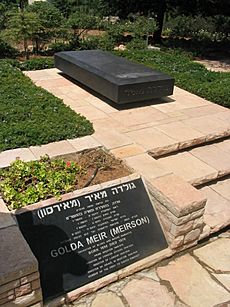
Golda Meir's husband was Morris Meyerson. They married on December 24, 1917. They remained married until he passed away in Jerusalem on May 25, 1951. Golda never remarried. Even though they never divorced, they grew apart over time. When Golda took her children to the United States in the 1930s, Morris stayed in Jerusalem.
Golda had two children. Her son, Menachem, was born in 1924 and became a professional cellist. Her daughter, Sarah, was born in 1926.
She had two sisters, Sheyna and Tzipke. Five other siblings died when they were children.
In 1956, when she became Foreign Minister, she changed her last name from "Meyerson" to "Meir." "Meir" means "illuminate" or "to light up" in Hebrew. This was because her predecessor had asked all foreign service members to use Hebrew last names.
Golda was a heavy smoker and drank a lot of coffee. She did not exercise much. These habits may have contributed to her heart problems.
She felt a strong connection to Jewish culture. However, she did not believe in God. She is famous for saying: "I believe in the Jewish people, and the Jewish people believe in God."
Awards and Recognition
In 1974, Golda Meir was honored as World Mother by American Mothers. In 1974, she received the James Madison Award for Distinguished Public Service.
In 1975, Golda Meir was given the Israel Prize. This is a very high honor in Israel. It was for her special contributions to society and the State of Israel.
In 1985, Golda Meir was added to the Colorado Women's Hall of Fame.
Legacy and Portrayals
Historians say that Golda Meir's main legacy includes her strong leadership of the Labor Movement. She also built good relationships with many developing countries. She was very successful as Labor and Housing Secretary. However, most historians agree she faced challenges as prime minister.
Portrayals in Film and Theater
Golda Meir's life story has been shown in many plays and movies.
- In 1977, Anne Bancroft played Golda in the Broadway play Golda.
- In the TV movie A Woman Called Golda (1982), Judy Davis played a young Golda. Ingrid Bergman played the older Golda in the same film.
- Actress Colleen Dewhurst played Golda in the 1986 TV movie Sword of Gideon.
- In 2003, Tovah Feldshuh played her on Broadway in Golda's Balcony.
- In 2005, actress Lynn Cohen played Golda in Steven Spielberg's film Munich.
- Tovah Feldshuh played Golda again in the 2006 movie O Jerusalem.
- The Polish actress Beata Fudalej played her in the 2009 film The Hope.
- Actress Helen Mirren played Golda Meir in the film Golda, which focuses on the Yom Kippur War.
- A TV mini-series called Lioness is being made, starring Shira Haas.
Commemoration
Many places and things are named after Golda Meir:
- The Golda Meir House Museum and Education Center in Denver, Colorado.
- The Golda Meir School in Milwaukee, Wisconsin.
- The Golda Meir School in Rio de Janeiro, Brazil.
- The Golda Meir Library at the University of Wisconsin–Milwaukee.
- Golda Meir Boulevard in Jerusalem, Israel, and other streets and schools in Israel.
- The Golda Meir Center for the Performing Arts in Tel Aviv.
- A Bust of Golda Meir at Golda Meir Square in New York City.
- The Golda Meir Center for Political Leadership in Denver.
- Golda Meir House in Newton, Massachusetts.
- Golda Meir Street in Kyiv, Ukraine.
Published Works
- This Is Our Strength (1962) – A collection of Golda Meir's writings.
- My Father's House (1972)
- My Life (1975) – Her autobiography.
See also
 In Spanish: Golda Meir para niños
In Spanish: Golda Meir para niños
- Évian Conference
- List of Israel Prize recipients
 | Anna J. Cooper |
 | Mary McLeod Bethune |
 | Lillie Mae Bradford |


